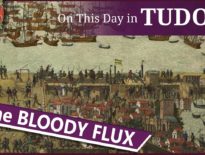On this day in Tudor history, 1st September 1566, Edward Alleyn, a major figure in the Elizabethan theatre, was born in the parish of St Botolph without Bishopsgate, London, and baptised the following day.
In today's talk, I share some facts about Edward Alleyn, including his personal life, the plays he was involved in, his theatre investments, and his desire to be appointed master of the bears, bulls and mastiff dogs!
Also on this day in Tudor history, 1st September 1532, in a special ceremony at Windsor Castle, King Henry VIII elevated his sweetheart Anne Boleyn to the peerage by making her Marquess of Pembroke. This was a hugely significant act because Henry VIII made Anne a marquess in her own right, granted the title to her and her heirs male (legitimate or not) and gave her a title associated with his father, Henry VII, and uncle, Jasper Tudor. It also made her a rather wealthy woman, and a fitting consort for their trip to Calais to meet with King Francis I of France. Find out more about what happened on this day in 1532, who was there, and just what Anne Boleyn was given by King Henry VIII, in last year’s video:
Also on this day in history:
- 1599 – Death of Dorcas Martin (née Eccleston), Lady Martin, translator, bookseller and Puritan. She was buried at All Hallows, Tottenham. Dorcas was married to Sir Richard Martin, Master of the Mint and Lord Mayor of London, and is known for her translations of prayers, psalms and catechisms.
- 1615 – Death of Sir Richard Knightley, member of Parliament, Sheriff of Northamptonshire and patron of Puritans, at Fawsley in Northamptonshire. Knightley was present at the executions of Anthony Babington and Mary, Queen of Scots, and was involved in the publication of the “Marprelate tracts”.
Transcript:
On this day in Tudor history, 1st September 1566, Edward Alleyn, actor, theatre entrepreneur and founder of Dulwich College and Alleyn's School, was born in the parish of St Botolph without Bishopsgate, London, and baptised the following day.
Alleyn was a major figure in the Elizabethan theatre, being a member of the Earl of Worcester's Players, Lord Strange's Men and then leading the Admiral's Men. In the 1590s, he played title roles in “Doctor Faustus”, “Tamburlaine”, and “The Jew of Malta” by Christopher Marlowe. The business side of his career saw him partnering with Philip Henslowe and becoming part owner of the Rose Theatre, the Paris Garden and the Fortune Theatre.
Let me share with you a few more facts about this Tudor man…
• Edward Alleyn was one of five sons born to Edward Alleyn of Willen in Buckinghamshire, and his wife, Margaret Townley.
• His father had moved to London by 1566 and had owned an inn in Bishopsgate before moving on to the royal court, where, in 1567, he was working as a porter to Queen Elizabeth. He was also head of Bethlehem Hospital, or Bedlam.
• Alleyn’s father died in 1570 and his mother married Richard Christopher and then John Browne.
• Alleyn was performing with the Earl of Worcester’s men by 1583, when he was 17, following in his brother John’s footsteps.
• In 1589, his brother John was manager and leader of the Admiral’s Men.
• By the early 1590s, Edward Alleyn was member of Lord Strange’s Men and was performing at Philip Henslowe’s Rose Theatre. He married Joan Woodward, Henslowe’s stepdaughter, in October 1592. The marriage was successful and loving, with Alleyn referring to her as his “mouse”. He also went into business partnership with Henslowe, running the Rose Theatre together.
• By 1594, Alleyn was the leader of the Admiral’s Men, a troupe of actors which competed with Shakespeare’s Lord Chamberlain’s Men.
• As I said earlier, he played title roles in Christopher Marlowe’s Tamburlaine the Great, Doctor Faustus and The Jew of Malta, as well as other important roles. Alleyn received much praise for his acting from the likes of Ben Jonson.
• Alleyn retired from the stage in 1597 and focused on business and trying to gain court positions. One he really wanted was master of the bears, bulls and mastiff dogs, but the new king, James I, granted it to his friend Sir William Stewart. Fortunately for Alleyn and Henslowe, Stewart allowed them to purchase the patent for the position in 1604 and the two men held the office jointly until Henslowe’s death in 1616. Alleyn then shared it with Henslowe’s son-in-law. In this position, Alleyn baited a lion before King James I at the Tower of London.
• In 1604, Alleyn was back acting, playing a role in a play put on for King James’ formal entry into London.
• In the late 1590s, Alleyn and Henslowe started work on a project to build a new playhouse in St Giles Cripplegate. Construction began in 1600 and the men had the support of Lord Admiral Charles Howard against opposition from local justices of the peace. The new playhouse, the Fortune, opened in summer 1600, hosting the Admiral’s Men troupe and featuring comedies and plays written by the likes of Thomas Dekker. It operated until it burnt down in December 1621. Alleyn immediately set about building a replacement.
• In 1607 and 1608, Alleyn worked as a vestryman and auditor of token books for his local church.
• In June 1623, Alleyn’s wife, Joan, died childless. Alleyn had her laid to rest in the chapel of a hospital he had endowed in 1619, a hospital which became Dulwich College. Alleyn remarried in December 1623, taking John Donne’s daughter, Constance, as his second wife. The marriage was also childless.
• Alleyn became ill in 1626 and made his will on 13th November. He died on 25th November 1626 aged 60 and was buried on 27th November in Dulwich College’s chapel. In his will, he left instructions and provision for the building of 10 almshouses.



Leave a Reply